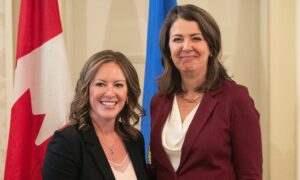Overview and Context
Premier Danielle Smith has been in office for 19 months and provides an opportunity to evaluate how Smith is proceeding in implementing the Free Alberta Strategy (FAS). I found that many boxes have been checked by the premier but her biggest test is ahead- how to prevent the federal from weakening Alberta’s largest industry in its bid to lower CO2 and other emissions.
Smith is closely associated with one of the FAS authors, Rob Anderson. Rob Anderson is now the Executive Director of the Office of the Premier which places him at the apex of policy-making in Alberta.  His acquaintance with Smith goes back to at least 2010 when, as a former Progressive Conservative (Airdrie -Chestermere), he crossed over to join the Wildrose Alliance party becoming deputy leader. In 2012, Anderson ran for the Wildrose Party and was re-elected in Airdrie. In October 2015, Anderson joined Danielle Smith in abandoning the Wildrose Party for Jim Prentice’s PC backbenches, a strategy that did not work well for the PCs, Wildrose or Danielle Smith.
His acquaintance with Smith goes back to at least 2010 when, as a former Progressive Conservative (Airdrie -Chestermere), he crossed over to join the Wildrose Alliance party becoming deputy leader. In 2012, Anderson ran for the Wildrose Party and was re-elected in Airdrie. In October 2015, Anderson joined Danielle Smith in abandoning the Wildrose Party for Jim Prentice’s PC backbenches, a strategy that did not work well for the PCs, Wildrose or Danielle Smith.
A centrepiece of the Free Alberta Strategy is an Alberta Sovereignty Act labelled as “sheer madness” by Rob Breakenridge in a 7 October 2021 Postmedia column. This piece of legislation was a key factor of Smith’s victorious leadership campaign. Bill 1, The Alberta Sovereignty Act, relabelled The Alberta Sovereignty within a United Canada Act was the first bill introduced by Smith in November 2022.
Anderson, since leaving elected office continued to dabble in separatist politics. Anderson had also formulated fiscal policies for the Wildrose Party but his authorship with University of Calgary professor Barry Cooper and Derek From published in September 2021, gave his post-political career a boost. My views on the Free Alberta Strategy’s banking strategy were published in January 2023 in The Conversation which generated a harsh rebuke from the FAS staff. My response can be found here.
Before proceeding it is necessary to outline the key elements of the Free Strategy. Firstly, the Fair Deal panel builds upon a whole host of literature developed out of the University of Calgary where professors Ted Morton, Rainer Knopf, Barry Cooper, Ted Morton, Tom Flanagan, David Bercuson, and Jack Mintz have been situated. Danielle Smith’s political education was considerably influenced by her undergraduate courses at U of C. For the most advanced thinking on Alberta separation, the volume Moment of Truth is recommended reading. The book was published in September 2020. Barry Cooper’s chapter entitled “Challenges to western Independence,” canvasses many of the tactical and constitutional obstacles to getting towards a referendum on western independence.
In 2020 the Fair Deal Panel reported and gave official sanction to Alberta’s sovereignist aspirations. The usual suspects were rolled out: an Alberta police force, equalization, fiscal stabilization payments, an Alberta revenue agency and pension plan, opt out of new federal shared cost programs, and federal firearms legislation and enforcement, and the Impact Assessment Act. Kenney’s government moved with alacrity to begin the investigation of the Panel’s recommendations, creating a Firearms Office, initiating inquiries on the Alberta Pension Plan, and initiating an equalization referendum.
In September 2021 the Fair Alberta Strategy and website was launched. The FAS offers some additional ideas to move Alberta into a place in confederation similar to Quebec. In addition to the Sovereignty Act, novel ideas included an independent Banking Act, taking over unemployment insurance, and establishing judicial independence. While many of the ideas were clearly unconstitutional, or arguably constitutional, this signalled a further advance to their separatist agenda. Inn the final chapter entitled “Final Resort” the authors chart out a “democratic process” for western Canadian independence.
Methodology
To assess the seriousness of the pursuit of the FAS agenda, I parsed from Alberta.ca/News website news releases which featured a mention of the “federal government. I selected federal government as key words because the Free Alberta Strategy is designed to neutralize the federal government’s influence in Alberta and Albertans’ lives by challenging the jurisdiction of the federal government.
My inquiry generated 47 examples of the federal government mentioned in a release from the date Smith was sworn in to 16 April 2024. The table below, which forms the basis for the analysis, lists the date of the announcement, the text of the announcement, which cabinet member(s) were involved, and the policy field. The table also includes hyperlinks to these news releases and statements.
Prior to the May 2023 provincial election period where governments do not typically announce governmental policy, the animus towards the federal government was focussed on justice issues – Tyler Shandro.  At the time Shandro was pushing against federal firearms legislation, the federal Emergencies Act and the desirability of firing the RCMP Commissioner. In all, Shandro was in Alberta News eight times, including sharing the release with Premier Smith. Shandro was ousted from his seat in Calgary Acadia in the May 2023 election.
At the time Shandro was pushing against federal firearms legislation, the federal Emergencies Act and the desirability of firing the RCMP Commissioner. In all, Shandro was in Alberta News eight times, including sharing the release with Premier Smith. Shandro was ousted from his seat in Calgary Acadia in the May 2023 election.
Not surprisingly Premier Smith was involved in 21 releases, many solo but many with ministers, especially Rebecca Schultz. Smith’s initial interests were passage of the Sovereignty Act. More recently, she has been front and centre in the province’s battle to preserve the oil and gas and petrochemicals industry. Other releases deal with both environmental legislation and federal overreach. Eight of her releases were hers alone and these were concentrated in February 2023, seemingly in response to her meeting with Prime Minister Trudeau. Caught shaking hands with Trudeau,

Smith swiftly followed the meeting with adversarial letters to Trudeau and some scathing comments about the “Just Transitions” legislation.
“Our government also has grave concerns with the complete lack of recognition in the Plan for the provinces’ constitutional rights to develop our natural resources and to manage our labour workforce. Implementing a federal plan of this magnitude in areas of exclusive provincial jurisdiction doesn’t merely require piecemeal “discussions” with the provinces, it requires outright provincial approval and cooperation.
Post-election
After the election interlude, Smith’s government continued to fight back against the federal government on a wider range of issues. From June to the end of October 2023, the Smith government issued six releases referring to the federal government mostly on the question of federal moves in electricity, energy, and the environment. Other than one joint federal provincial release on gender-based violence, Smith became increasingly strident in her remarks to protect Alberta’s sovereignty.
Her antagonism and contempt especially towards Environment and Climate Change minister Stephen Guilbeault boiled in her “Standing Up for Alberta” release on 15 July 2023.
“Further, if the minister is truly committed to reducing emissions around the world, he should busy himself with assisting Western Canada to replace emissions from coal, wood and dung in Asia and Africa with clean Canadian LNG. This would result in the lower worldwide emissions he claims to want. His referenced planned phaseout of Alberta’s oil and gas sector will only result in higher net worldwide emissions, along with serious poverty and energy insecurity in Canada and abroad.
In November and December 2023, the heat was further turned up on the federal government with a total of 11 releases. Aside from a favourable release from Nate Glubish on connecting the Rainbow Lake community which involved federal funds, attacks notably from Rebecca Schulz, Smith’s Environment Minister, led the way.

Ottawa, ONTARIO, Canada on October 21, 2021.
© HOC-CDC
Credit: Mélanie Provencher, House of Commons Photo Services
On 8 November Schulz issued a release titled “Commissioner calls out federal failures: Minister Schulz” which highlighted the failures of Environment and Climate Change Canada reported by the Environment Commissioner.
The commissioner of the Environment and Sustainable Development – appointed by the auditor general of Canada – has released a scathing report that should serve as a great embarrassment to federal Environment and Climate Change Minister Steven Guilbeault.
“Chief among the findings, the commissioner found that the federal government will fail to reach its own 2030 emissions target. He went further, pointing out that the federal government uses poor modelling with faulty assumptions, little analysis and no peer review.
Ironically, Schulz and her department face a similar criticism for failing to report on progress on Alberta’s emissions reduction program released over a year ago. Perhaps Guilbeault will point this hypocrisy out.
Other broadsides featuring Smith and Schulz included the controversy over the draft clean electricity regulations and a Federal Court decision supporting Alberta and its petrochemicals and plastics industry.

Alberta is proudly home to Canada’s largest petrochemical sector, a sector with more than $18 billion in recently announced projects that were needlessly put in jeopardy by a virtue-signalling federal government with no respect for the division of powers outlined in the Canadian Constitution.
In “Defending Alberta from brownouts, blackouts and soaring costs,” Smith noted that despite working with the federal government for months, the federal government “remain committed to an absurdly unrealistic and unattainable goal of a net-zero power grid by 2035.” Smith was responding to a critical shortage of baseload electricity which was used to leverage opposition to Ottawa’s proposed clean electricity regulations. Soon after, the taxpayers of Alberta were paying $8-million for cross country ads conjuring up future blackouts caused by Ottawa’s policy intransigence. This was followed by the introduction of a resolution under the Alberta Sovereignty Act within a United Canada Act resolution to “counteract the harms and risks to Albertans posed by the federal CERs (Clean Electricity Regulations).”
However, the nastiest attack against federal minister Guilbeault were still to come.
|
Broadsides against Guilbeault Steven Guilbeault has once again shown his utter contempt for Alberta, our economy and our energy workers. “While advising the Chinese Communist Party about its environmental policies, Minister Guilbeault Minister Guilbeault’s comments are a continuation of his provocative verbal attacks on Alberta’s energy sector, the most environmentally responsible and ethical energy-producing jurisdiction in the world. Minister Guilbeault’s unrealistic 2035 net-zero power grid plan will make electricity unreliable and unaffordable for millions of Albertans. this must be done in a collaborative and respectful fashion without Minister Guilbeault’s continued threats to the economic well-being of Albertans and Canadians.” Standing up for Alberta Aug 30, 2023 “In an act of desperation, Minister of Environment and Climate Change Steven Guilbeault and Prime Minister Justin Trudeau have the audacity to try and ‘rebrand’ the carbon tax – a cynical and desperate ploy that will fail. “ Rebranding the carbon tax won’t fix a failure Feb 14, 2024 “eco-extremist Minister of the Environment and Climate Change Steven Guilbeault are risking hundreds of billions of dollars of investments in Alberta’s and Canada’s economies. “ Federal emissions cap: Joint statement Dec 07, 2023 Instead of building on Alberta’s award-winning approach, Ottawa wants to replace it with costly, dangerous and unconstitutional new federal regulations that won’t benefit anyone beyond Environment and Climate Change Minister Steven Guilbeault’s post-office career. Federal methane emissions targets Dec 04, 2023 “has released a scathing report that should serve as a great embarrassment to federal Environment and Climate Change Minister Steven Guilbeault. Commissioner calls out federal failures Nov 08, 2023 |
Analysis/Opinion
Both Trudeau and Smith are between a rock and a hard place. For Trudeau he has made certain commitments internationally that he believes Canada should keep. Today he is facing the harsh reality that the federal government has a few limited levers. Since much of Canada’s jurisdiction is a shared one, agreement with the provinces is necessary. This is particularly in respect of environment regulation and the province’s “exclusive” jurisdiction over natural resources. From 2015 to 2018, his Environment Minister Catherine McKenna was able to stickhandle the file brining most provinces on board. But by 2019, governments had changed in Alberta and Ontario meaning litigation over carbon pricing, the Impact Assessment Act and firearms legislation.
Smith is also in a jam because whatever her personal views on the climate emergency, as Premier should must defend the interests of Alberta’s largest industry. As such, she is the de facto the vice-president of communications for oil and fossil gas industries. However, as more evidence comes to light tying Smith with the oil industry (RStar comes immediately to mind), the more she risks alienating centre-right voters who are nervous about her “extreme views,” conveniently walked back during the election. Many voters are also worried about the influence, real or imagined of David Parker and his Take Back Alberta faction. Particularly galling to centrist voters is the pursuit of a separate Alberta Pension Plan where upwards of $7-million of tax money has gone to promote a misleading version of future APP benefits. Many Albertans are also disturbed that CPP beneficiaries’ pensions would become more risky (political interference).
In addition, the voice of ranchers is being heard as a result of a court’s recent decision against the Department of Energy about disclosure of documents relating to the reversal of the coal moratorium under Jason Kenney. Ranchers are particularly influential in the foothills. Increasingly farmers are wary or fed up with the orphan well problem, fracking and unpaid taxes of oil companies. This is further exacerbated as more research becomes available on the cosy relationship between the oil and gas industry and the Alberta Energy Regulator.
 Back in time, during the National Energy Plan battle, Trudeau and Lougheed respected each other. This is not true with considerable ill will displayed in her attacks against the federal government, Trudeau and Guilbeault.
Back in time, during the National Energy Plan battle, Trudeau and Lougheed respected each other. This is not true with considerable ill will displayed in her attacks against the federal government, Trudeau and Guilbeault.
FAS and Smith
Smith has made considerable progress on the Free Alberta Strategy. Key victories were passage of the Sovereignty Act and a resolution to defend Alberta from blackouts and soaring costs related to clean electricity regulations. She has advanced the Alberta Pension Plan with the introduction, by Nate Horner, of the euphemistic Alberta Pension Protection Act Plan.
The notion of an Alberta Revenue Agency is still on the agenda and included in the mandate letter to Nate Horner. This goal will allow Alberta to have full command of its personal income tax system to make Alberta more hospitable for high income earners. One of the recommendations of the Fair Deal Panel, to establish an office in Ottawa has been realized. This will give Alberta government officials close personal access to MPs, national media, lobbyists, and national associations. This type of proximity is necessary when it comes to gaining influence at a time when a significant government changeover is expected.
On the Alberta police force concept, Bill 11, the Public Safety Statutes Amendment Act, 2024, establishes a ” independent agency police service.” This change will provide considerable flexibility to the provincial cabinet and responsible minister to appoint officers independent of any legislative oversight.
Although banking has yet to appear on the legislative docket, changes to other pieces of legislation (ATB Financial Act or the Loan and Trust Corporations Act) could be made to make more attractive for financial institutions to establish in the province. A key irritant of the UCP and its supporters was the freezing of bank accounts under the Emergencies Act. It would be next to impossible for Alberta to prevent a future instance of freezing accounts but resolutions under the Sovereignty Act could sharply turn public opinion against federally-regulated banks and the federal government.
So the Smith government has advanced along the gridiron towards Alberta separatism. While some of this is snide attacks on Ottawa, the federal government, or persons in political office, as a province Alberta has significant levers by which to frustrate federal influence in Alberta. Most recently, Bill 18, the Provincial Priorities Act will make it very difficult for municipalities and universities to contract directly with the federal government.
Related Posts
Breaking News- Premier Smith’s delivers ultimatum to Trudeau
Smith to Trudeau- Olive branch or iron fist in a velvet glove?